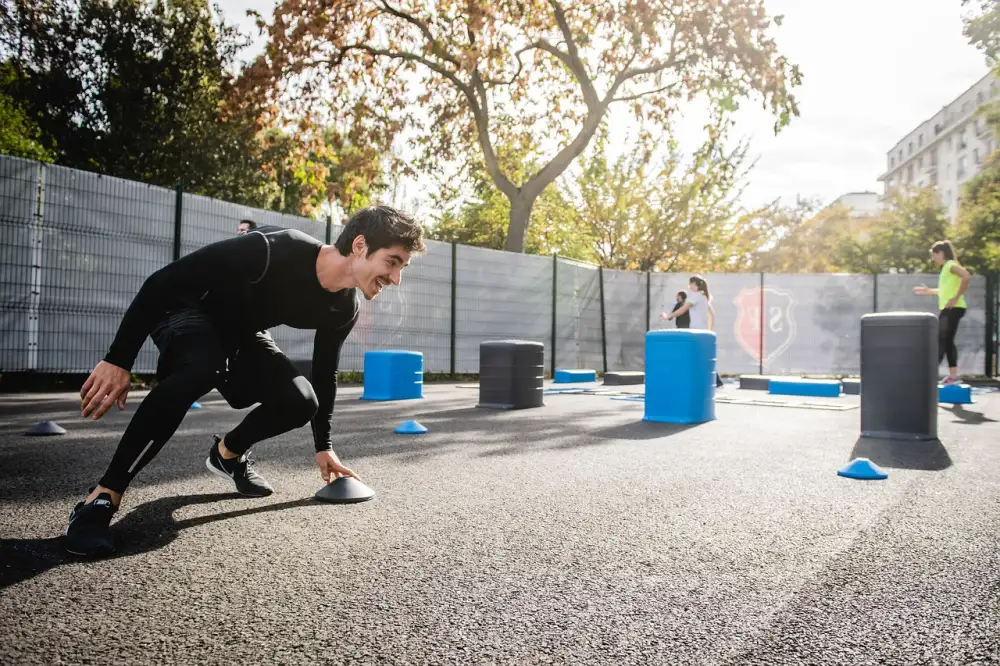Rate My Workout: Seeking Feedback on Your Fitness Routine for Optimal Health

- Benefits of seeking feedback on your workout routine:
- Enhances effectiveness: Feedback helps identify areas for improvement and optimize your workout for better results.
- Prevents plateaus: Regular feedback ensures you avoid getting stuck in a fitness plateau by making necessary adjustments.
- Motivation and accountability: Positive feedback boosts motivation, while constructive criticism keeps you accountable for your progress.
- How to effectively seek feedback on your workout routine:
- Join fitness communities: Engage with like-minded individuals who can provide valuable insights and suggestions.
- Consult with professionals: Seek guidance from certified trainers or fitness experts who can offer expert advice.
- Use online platforms: Utilize fitness apps or websites that allow you to share your workout routine and receive feedback from a wider audience.
- Key aspects to consider when asking for feedback:
- Clear goals: Clearly define your fitness goals to receive feedback that aligns with your objectives.
- Specific questions: Ask targeted questions about specific exercises, form, intensity, or any concerns you may have.
- Provide context: Share relevant information about your fitness level, any injuries, or limitations to receive tailored feedback.
- Evaluating feedback received:
- Analyze multiple perspectives: Consider different opinions and evaluate the credibility of the sources providing feedback.
- Experiment and track progress: Implement suggested changes and monitor how they impact your workout and overall progress.
- Adapt and iterate: Continuously adapt your routine based on the feedback received to optimize your fitness journey.
In today's fitness world, seeking feedback on your workout routine has become increasingly popular. The concept of "Rate My Workout" involves sharing your exercise regimen with others and receiving valuable input to optimize your fitness journey. This process is highly regarded in the fitness community as it allows individuals to enhance their effectiveness, prevent plateaus, and stay motivated. By actively seeking feedback, you can unlock new levels of success in achieving your fitness goals.
Benefits of seeking feedback on your workout routine:
Seeking feedback on your workout routine offers numerous benefits. Firstly, it enhances effectiveness by identifying areas for improvement and optimizing your workout for better results. Secondly, it prevents plateaus by making necessary adjustments and avoiding stagnation in your fitness journey. Additionally, feedback provides motivation and accountability - positive feedback boosts motivation while constructive criticism keeps you accountable for your progress. Overall, seeking feedback is essential for optimal health and continuous improvement in your fitness routine.
Enhances effectiveness: Feedback helps identify areas for improvement and optimize your workout for better results.
Seeking feedback on your workout routine can greatly enhance its effectiveness. By receiving input from others, you can identify areas for improvement and optimize your workout for better results. Feedback allows you to gain valuable insights into what is working well and what may need adjustment. This information can help you make necessary changes to your routine, such as modifying exercises, adjusting intensity levels, or incorporating new techniques. As a result, you can maximize the benefits of your workout and achieve your fitness goals more efficiently.
Prevents plateaus: Regular feedback ensures you avoid getting stuck in a fitness plateau by making necessary adjustments.
Regular feedback on your workout routine is crucial to prevent hitting a fitness plateau. When you perform the same exercises repeatedly without making any adjustments, your body becomes accustomed to the routine, leading to diminished results. By seeking feedback, you can identify areas that need improvement and make necessary adjustments to keep challenging your body. This could include increasing the intensity of your workouts, trying new exercises, or changing up your training schedule. Preventing plateaus ensures continuous progress and helps you achieve optimal health and fitness levels.
Motivation and accountability: Positive feedback boosts motivation, while constructive criticism keeps you accountable for your progress.
Receiving feedback on your workout routine not only enhances its effectiveness but also provides the much-needed motivation and accountability. Positive feedback acts as a powerful motivator, fueling your drive to push harder and achieve better results. On the other hand, constructive criticism keeps you accountable for your progress by highlighting areas that need improvement. This combination of motivation and accountability is essential for maintaining consistency and staying on track towards your fitness goals.
How to effectively seek feedback on your workout routine:
To effectively seek feedback on your workout routine, there are several strategies you can employ. Firstly, consider joining fitness communities where you can engage with like-minded individuals who can provide valuable insights and suggestions based on their own experiences. Secondly, consult with professionals such as certified trainers or fitness experts who can offer expert advice tailored to your specific needs and goals. Lastly, take advantage of online platforms such as fitness apps or websites that allow you to share your workout routine and receive feedback from a wider audience. These platforms provide an opportunity for diverse perspectives and a larger pool of expertise to help optimize your fitness journey.
Join fitness communities: Engage with like-minded individuals who can provide valuable insights and suggestions.
Joining fitness communities is a great way to seek feedback on your workout routine. By engaging with like-minded individuals, you can tap into a wealth of knowledge and experience. These communities provide valuable insights and suggestions that can help improve the effectiveness of your workouts. Whether it's discussing different exercises, sharing tips on form and technique, or exchanging ideas for overcoming challenges, being part of a fitness community offers a supportive network that can enhance your fitness journey.
Consult with professionals: Seek guidance from certified trainers or fitness experts who can offer expert advice.
Consulting with professionals is crucial for receiving expert advice on your workout routine. Certified trainers and fitness experts have the knowledge and experience to provide personalized guidance based on your specific needs and goals. They can assess your current fitness level, identify areas for improvement, and suggest modifications to optimize your workouts. Their expertise ensures that you are following safe and effective practices, reducing the risk of injury and maximizing results. Seeking professional guidance is a valuable investment in your fitness journey.
Use online platforms: Utilize fitness apps or websites that allow you to share your workout routine and receive feedback from a wider audience.
In today's digital age, there are numerous fitness apps and websites that provide a platform for sharing your workout routine and receiving feedback from a wider audience. These online platforms offer a convenient way to connect with fellow fitness enthusiasts, trainers, and experts from around the world. By utilizing these resources, you can tap into a vast pool of knowledge and experience to gain valuable insights and suggestions for improving your workout routine. Whether it's posting videos of your exercises or seeking advice on specific aspects of your routine, online platforms offer an interactive space where you can engage with others who share your passion for fitness. Take advantage of these tools to expand your network, learn from others' experiences, and receive feedback that can help take your workouts to the next level.
Key aspects to consider when asking for feedback:
1. Clear goals: Clearly define your fitness goals to receive feedback that aligns with your objectives. Whether it's building strength, losing weight, or improving endurance, having a clear direction will help you get targeted feedback.
2. Specific questions: Ask targeted questions about specific exercises, form, intensity, or any concerns you may have. This will ensure that the feedback you receive is relevant and actionable.
3. Provide context: Share relevant information about your fitness level, any injuries, or limitations to receive tailored feedback. This will help others understand your unique situation and provide advice that takes into account your individual needs.
By considering these key aspects when seeking feedback on your workout routine, you can ensure that the advice you receive is personalized and beneficial for your fitness journey.
Clear goals: Clearly define your fitness goals to receive feedback that aligns with your objectives.
When seeking feedback on your workout routine, it is crucial to have clear goals in mind. By clearly defining your fitness objectives, you can receive feedback that aligns with what you want to achieve. Whether your goal is weight loss, muscle gain, or improved endurance, having a specific target allows others to provide more focused and tailored feedback. This ensures that the advice and suggestions you receive are relevant and will help you progress towards your desired outcome. So take the time to clarify your fitness goals before seeking feedback, as it will greatly enhance the effectiveness of the advice you receive.
Specific questions: Ask targeted questions about specific exercises, form, intensity, or any concerns you may have.
When seeking feedback on your workout routine, it is important to ask specific questions about certain aspects of your exercises. Inquire about the correct form and technique for particular movements to ensure you are maximizing their benefits and minimizing the risk of injury. Seek advice on the appropriate intensity level for your fitness goals and any concerns you may have regarding specific exercises. By asking targeted questions, you can receive more precise feedback that will help optimize your workout routine.
Provide context: Share relevant information about your fitness level, any injuries, or limitations to receive tailored feedback.
When seeking feedback on your workout routine, it is essential to provide context about your fitness level, any injuries, or limitations you may have. This information allows others to offer tailored feedback that takes into account your specific circumstances. Whether you are a beginner or an experienced athlete, sharing relevant details about your current fitness situation will help ensure the feedback you receive is accurate and beneficial for your progress.
Evaluating feedback received:
Evaluating feedback received is crucial for optimizing your workout routine. Analyze multiple perspectives from credible sources to make informed decisions. Experiment with suggested changes and track your progress to see their impact. Continuously adapt and iterate your routine based on the feedback received for ongoing improvement.
Analyze multiple perspectives: Consider different opinions and evaluate the credibility of the sources providing feedback.
When seeking feedback on your workout routine, it's important to analyze multiple perspectives. Consider different opinions and evaluate the credibility of the sources providing feedback. Look for individuals who have knowledge and experience in the fitness industry or have achieved success in their own fitness journeys. Take into account their qualifications, expertise, and track record before implementing any suggested changes. By considering a range of perspectives, you can make informed decisions about what will work best for your unique fitness goals and needs.
Experiment and track progress: Implement suggested changes and monitor how they impact your workout and overall progress.
Once you have received feedback on your workout routine, it is crucial to experiment with the suggested changes and track your progress. Implementing these changes allows you to see how they impact your workout and overall progress. By monitoring your performance, you can determine whether the adjustments are effective in enhancing your fitness goals. Tracking progress also helps you stay motivated and provides tangible evidence of the improvements made through the feedback received. Remember, consistency is key when evaluating the impact of any modifications to your workout routine.
Adapt and iterate: Continuously adapt your routine based on the feedback received to optimize your fitness journey.
Adapting and iterating your workout routine based on feedback is crucial for optimizing your fitness journey. As you receive feedback from various sources, such as fitness communities or professionals, it's important to analyze and implement the suggested changes. By experimenting with these adjustments and tracking your progress, you can determine what works best for you. Continuously adapting your routine will help you overcome plateaus, enhance effectiveness, and achieve optimal health and fitness results.
In conclusion, seeking feedback on your workout routine is crucial for achieving optimal fitness success. By actively engaging in the "Rate My Workout" process, you can enhance the effectiveness of your routine, prevent plateaus, and stay motivated. Whether through fitness communities, professional guidance, or online platforms, seeking feedback allows you to make necessary adjustments and continuously improve. So don't hesitate to seek feedback and embrace the opportunity for continuous improvement on your fitness journey.
Published: 05. 03. 2024
Category: Health



